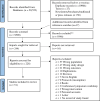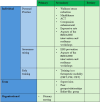Interventions to address empathy-based stress in mental health workers: A scoping review and research agenda
- PMID: 39637067
- PMCID: PMC11620613
- DOI: 10.1371/journal.pone.0306757
Interventions to address empathy-based stress in mental health workers: A scoping review and research agenda
Abstract
Consistently engaging with client distress can negatively impact mental health workers (MHWs). This has been described by the concept of empathy-based stress (EBS) (which encompasses burnout; secondary traumatic stress; compassion fatigue and vicarious trauma). Previous reviews of interventions to reduce EBS have not addressed MHWs as a distinct group, despite evidence suggesting they are particularly vulnerable to it. In the context of rising demand for mental health services, it is especially important to understand how to mitigate the impact of EBS on MHWS. This scoping review therefore aimed to identify and describe available interventions to reduce or prevent EBS in MHWs. A systematic scoping review of the literature between 1970 and 2022 was undertaken using five electronic databases. A total of 51 studies were included, which varied significantly with regards to: interventions used; study methodology and theoretical underpinnings. Studies were grouped according to the level at which they aimed to intervene, namely: individual; team or organisational. The review concluded that most studies intervened at the level of the individual, despite the proposed causes of EBS being predominantly organisational. Furthermore, theoretical links to the origins of EBS were largely unclear. This suggests a lack of empirical evidence from which organisations employing MHWs can draw, to meaningfully prevent or reduce EBS in their staff. A dedicated research agenda is outlined to address this, and, other pertinent issues in the field and signifies a call for more theoretically grounded research.
Copyright: © 2024 May et al. This is an open access article distributed under the terms of the Creative Commons Attribution License, which permits unrestricted use, distribution, and reproduction in any medium, provided the original author and source are credited.
Conflict of interest statement
The authors have declared that no competing interests exist.
Figures
References
Publication types
MeSH terms
LinkOut - more resources
Full Text Sources
Miscellaneous




